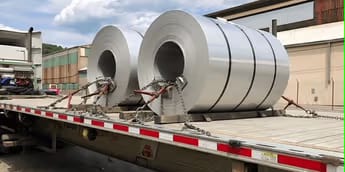In the world of logistics and heavy transport, the sight of a truck carrying only two rolls of steel might raise eyebrows.
However, this seemingly inefficient practice is rooted in a complex interplay of safety, weight regulations, and industry standards. READ FULL STORY
In this article, EAFeed seeks to explore the reasons behind this transport strategy, highlighting the importance of load distribution, vehicle stability and regulatory considerations.
According to the Transport Information Service, coils are transported using vehicles equipped with appropriately sized coil troughs.
Trucks typically carry only two rolls of steel due to several logistical and regulatory factors.
Each roll, particularly Hot-Rolled Coils (HRC), can weigh between 10 and 18 tonnes, necessitating careful weight management to comply with weighbridge regulations.
The largest trucks, such as triple axle 12-wheeled duals, can only transport two of these heavy rolls without exceeding legal weight limits during verification at weighbridges.
The design of the trucks also plays a crucial role. They must have appropriately sized coil troughs to securely hold the rolls, which need to be stabilized with lashings to prevent lateral movement during transit.
This careful securing is essential to avoid accidents, as loose coils can pose significant dangers on the road.
Additionally, the transportation of steel coils requires adherence to safety standards that dictate how cargo is loaded and secured, further limiting the number of rolls that can be safely transported at one time.
These coils are widely utilized across various industries due to their strength, versatility, and cost-effectiveness.
In the construction industry, they are fundamental for structural components such as beams, columns, and reinforcements.
Their ability to be formed into large sections makes them ideal for building frameworks and infrastructure projects like bridges.
In the automotive manufacturing sector, hot-rolled steel is commonly used for vehicle frames, chassis, and engine components.
The shipbuilding industry also relies on hot-rolled coils for constructing hulls and other structural elements of ships.
Its resistance to deformation under high stress is crucial for marine applications, ensuring the safety and integrity of vessels.
Additionally, hot-rolled steel is essential in manufacturing agricultural machinery and mining equipment, such as tractors and harvesters.







